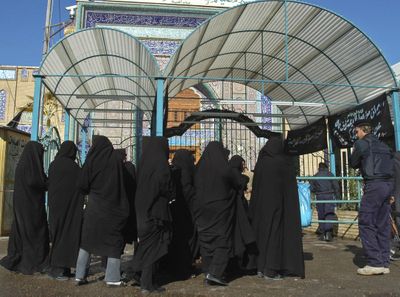Bomber kills dozens at Baghdad shrine
Worshippers had gathered outside mosque of prominent Shiite saint

BAGHDAD – A woman hiding among Iranian pilgrims with a bomb strapped under her black robe killed more than three dozen people Sunday outside a Baghdad mosque during ceremonies commemorating the death of one of Shiite Islam’s most revered saints.
The suicide attack, the most recent in a series that has killed more than 60 people in less than a week, was the latest to mar the transfer of many security responsibilities from the U.S. military to Iraqi forces.
Iraqi security forces have deployed thousands of troops in Baghdad and in the Shiite holy city of Karbala, just south of the capital, to safeguard against attacks during the ceremonies. Attacks by al-Qaida in Iraq, Sunni insurgents and even a Shiite cult have killed hundreds of people in recent years.
The attack in Baghdad’s northern Shiite neighborhood of Kazimiyah, which wounded at least 72 people, comes two days after a suicide bomber slipped into a luncheon at a tribal leader’s home south of Baghdad and killed at least 23 people. More than a dozen other people have died in other attacks since New Year’s Day.
The Iraqi military held parades to mark the anniversary of its founding 88 years ago and to celebrate a security agreement with the United States that went into effect on Jan. 1.
Under the new agreement, U.S. troops will no longer conduct unilateral operations and will act only in concert with Iraqi forces. They must also leave major Iraqi cities by June and withdraw all troops by the end of 2011.
In another sign of the transition in authority Sunday, the U.S. military handed over to the Iraqi government control in Diyala province of about 9,000 Sons of Iraq, a predominantly Sunni group of former insurgents and tribesmen whose revolt against al-Qaida in Iraq gave a significant boost to security in the turbulent province and helped turn the tide in the war against the terror group.
The United States paid the group’s estimated 90,000 members countrywide about $300 a month. Eventually, the members are to be either integrated into the Iraqi military and police, or provided civilian jobs and vocational training.
Under the phased handover, which began last year in Baghdad, Iraqi authorities will continue that pay and education strategy.
Iraqi President Jalal Talabani told Iraqi army troops during a parade marking Army Day that “the Iraqi army has gained the trust of government and Iraqi people as the army of all Iraqis.” The military parade, which included recently purchased U.S. military equipment and armored vehicles, was the first since the U.S.-Iraq agreement went into effect on Jan. 1.
Just as the parade took place around noon, hundreds of worshippers had gathered in Kazimiyah just a few miles to the north, home to the shrine of Imam Mousa al-Kazim, one of the holiest men in Shiite Islam.
The suicide bomber was among a group of Iranian pilgrims and she blew herself up just outside the gates of the mosque, a large building graced by four minarets. The office of Iraqi army spokesman Brig. Gen. Qassim al-Moussawi confirmed a woman wearing an explosives vest was responsible.
Thousands of pilgrims from predominantly Shiite Iran visit during Ashura, celebrated on Jan. 7 this year.